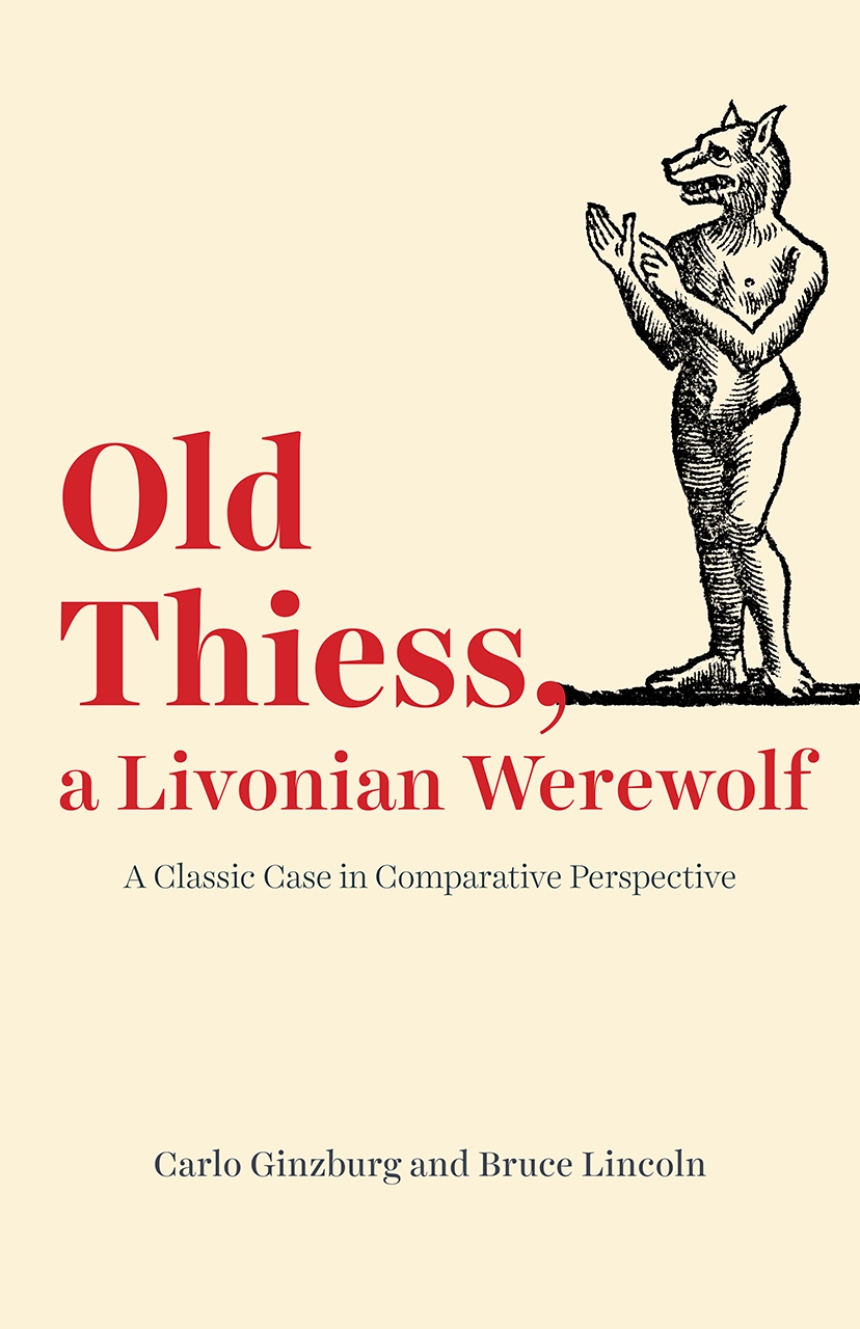Old Thiess, a Livonian Werewolf
A Classic Case in Comparative Perspective
9780226674414
9780226674551
Old Thiess, a Livonian Werewolf
A Classic Case in Comparative Perspective
In 1691, a Livonian peasant known as Old Thiess boldly announced before a district court that he was a werewolf. Yet far from being a diabolical monster, he insisted, he was one of the “hounds of God,” fierce guardians who battled sorcerers, witches, and even Satan to protect the fields, flocks, and humanity—a baffling claim that attracted the notice of the judges then and still commands attention from historians today.
In this book, eminent scholars Carlo Ginzburg and Bruce Lincoln offer a uniquely comparative look at the trial and startling testimony of Old Thiess. They present the first English translation of the trial transcript, in which the man’s own voice can be heard, before turning to subsequent analyses of the event, which range from efforts to connect Old Thiess to shamanistic practices to the argument that he was reacting against cruel stereotypes of the “Livonian werewolf” a Germanic elite used to justify their rule over the Baltic peasantry. As Ginzburg and Lincoln debate their own and others’ perspectives, they also reflect on broader issues of historical theory, method, and politics. Part source text of the trial, part discussion of historians’ thoughts on the case, and part dialogue over the merits and perils of their different methodological approaches, Old Thiess, a Livonian Werewolf opens up fresh insight into a remarkable historical occurrence and, through it, the very discipline of history itself.
In this book, eminent scholars Carlo Ginzburg and Bruce Lincoln offer a uniquely comparative look at the trial and startling testimony of Old Thiess. They present the first English translation of the trial transcript, in which the man’s own voice can be heard, before turning to subsequent analyses of the event, which range from efforts to connect Old Thiess to shamanistic practices to the argument that he was reacting against cruel stereotypes of the “Livonian werewolf” a Germanic elite used to justify their rule over the Baltic peasantry. As Ginzburg and Lincoln debate their own and others’ perspectives, they also reflect on broader issues of historical theory, method, and politics. Part source text of the trial, part discussion of historians’ thoughts on the case, and part dialogue over the merits and perils of their different methodological approaches, Old Thiess, a Livonian Werewolf opens up fresh insight into a remarkable historical occurrence and, through it, the very discipline of history itself.
The trial transcript is available as a PDF.
272 pages | 12 halftones, 3 tables | 5 1/2 x 8 1/2 | © 2020
Anthropology: Cultural and Social Anthropology
History: European History
Reviews
Table of Contents
Introduction
Introduction, a Postscript
1. The Trial
2. Comparison of Old Thiess to Germanic Cult Groups, Folklore, and Persephone Myths
3. Comparison of Old Thiess to Friulian Benandanti, Russian Werewolves, and Shamanic Others
4. Comparison of Old Thiess to Learned Descriptions and Stereotypes of Livonian Werewolves and to the Benandanti: A Seventeenth-Century Werewolf and the Drama of Religious Resistance
5. Ginzburg Responds to Lincoln: Conjunctive Anomalies—A Reflection on Werewolves
6. Lincoln Responds to Ginzburg: Letter of February 8, 2017
7. The Case of Old Thiess: A Comparative Perspective
Bruce Lincoln
Introduction, a Postscript
Carlo Ginzburg
1. The Trial
Transcript from the Hearings at the Provincial Court of Venden (April 28, 1691)
The Verdict Pronounced by the High Court of Dorpat [Tartu] (October 31, 1692)
The Verdict Pronounced by the High Court of Dorpat [Tartu] (October 31, 1692)
2. Comparison of Old Thiess to Germanic Cult Groups, Folklore, and Persephone Myths
Otto Höfler; translated by Bruce Lincoln
3. Comparison of Old Thiess to Friulian Benandanti, Russian Werewolves, and Shamanic Others
Carlo Ginzburg
From The Night Battles: Witchcraft and Agrarian Cults in the Sixteenth and Seventeenth Centuries (1980)
From “Germanic Mythology and Nazism: Thoughts on an Old Book by Georges Dumézil,” in Clues, Myths, and the Historical Method (1989)
“Freud, the Wolf-Man, and the Werewolves,” in Clues, Myths, and the Historical Method (1989)
From Ecstasies: Deciphering the Witches’ Sabbath (1989)
From “Germanic Mythology and Nazism: Thoughts on an Old Book by Georges Dumézil,” in Clues, Myths, and the Historical Method (1989)
“Freud, the Wolf-Man, and the Werewolves,” in Clues, Myths, and the Historical Method (1989)
From Ecstasies: Deciphering the Witches’ Sabbath (1989)
4. Comparison of Old Thiess to Learned Descriptions and Stereotypes of Livonian Werewolves and to the Benandanti: A Seventeenth-Century Werewolf and the Drama of Religious Resistance
Bruce Lincoln
5. Ginzburg Responds to Lincoln: Conjunctive Anomalies—A Reflection on Werewolves
6. Lincoln Responds to Ginzburg: Letter of February 8, 2017
7. The Case of Old Thiess: A Comparative Perspective
A Conversation: Saturday, September 30, 2017
The Conversation Continues: Monday, October 2, 2017
The Conversation Continues: Monday, October 2, 2017
Appendix A: Commonalities between Thiess’s Testimony and Descriptions of Livonian Werewolves in Learned Literature
Appendix B: A Livonian Narrative Featuring the Opposition of Werewolves and Witches
Acknowledgments
Notes
Suggestions for Further Reading
Index
Appendix B: A Livonian Narrative Featuring the Opposition of Werewolves and Witches
Acknowledgments
Notes
Suggestions for Further Reading
Index
Awards
American Academy of Religion: AAR Award for Excellence - Textual Studies
Shortlist
